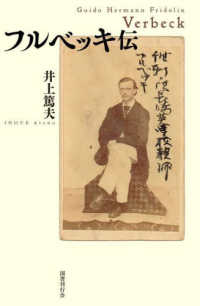- ホーム
- > 洋書
- > 英文書
- > History / World
基本説明
Argues that merchants, shopkeepers, artisans, and consumers throughout Western Europe were by no means proto-capitalist and did not treat their property as fungible assets. Although certain of their practices have seemed primitive to subsequent generations, they nevertheless helped make Europe's economic future possible.
Full Description
Martha C. Howell challenges dominant interpretations of the relationship between the so-called commercial revolution of late medieval Europe and the capitalist age that followed. She argues that the merchants, shopkeepers, artisans, and consumers in cities and courts throughout Western Europe, even in the urbanized Low Countries that are the main focus of this study, were by no means proto-capitalist and did not consider their property a fungible asset. Even though they freely bought and sold property using sophisticated financial techniques, they preserved its capacity to secure social bonds by intensifying market regulations and by assigning new meaning to marriage, gift-giving, and consumption. Later generations have sometimes found such actions perplexing, often dismissing them as evidence that business people of the late medieval and early modern worlds did not fully understand market rules. Howell, by contrast, shows that such practices were governed by a logic specific to their age and that, however primitive they may appear to subsequent generations, these practices made Europe's economic future possible.
Contents
Introduction; 1. Movable/immovable, what's in a name?; 2. 'Pour l'amour et affection conjugale'; 3. Gift work; 4. The dangers of dress; 5. Rescuing commerce; Afterword.







